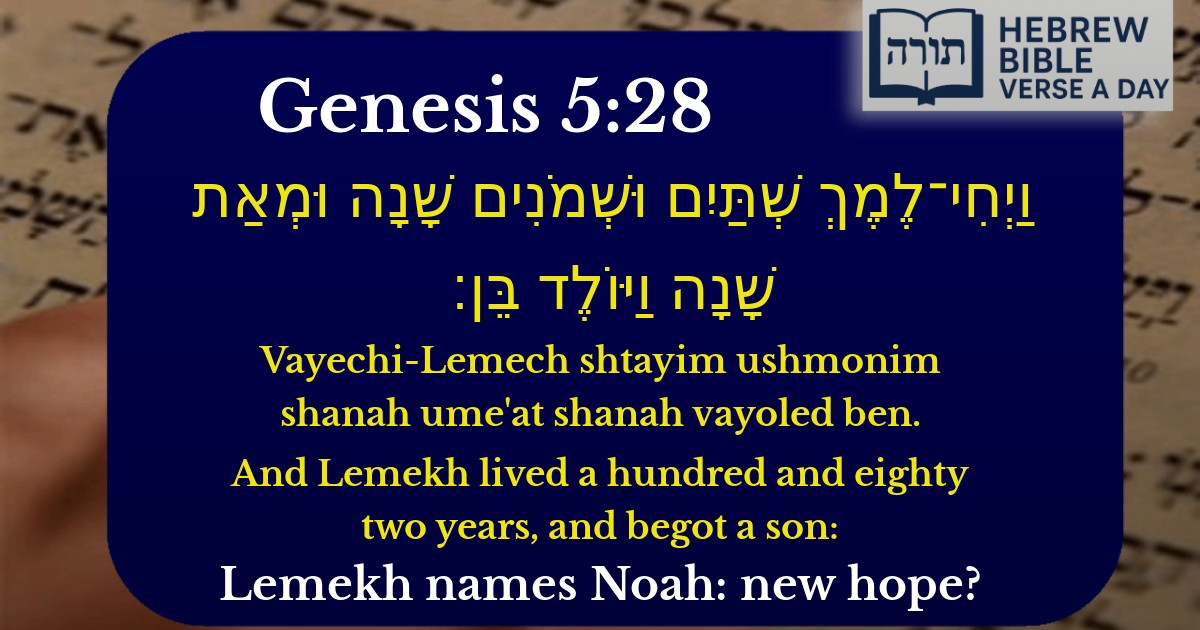Join Our Newsletter To Be Informed When New Videos Are Posted
Join the thousands of fellow Studends who rely on our videos to learn how to read the bible in Hebrew for free!
Hebrew Text
וַיְחִי־לֶמֶךְ שְׁתַּיִם וּשְׁמֹנִים שָׁנָה וּמְאַת שָׁנָה וַיּוֹלֶד בֵּן׃
English Translation
And Lemekh lived a hundred and eighty two years, and begot a son:
Transliteration
Vayechi-Lemech shtayim ushmonim shanah ume'at shanah vayoled ben.
Hebrew Leining Text
וַֽיְחִי־לֶ֕מֶךְ שְׁתַּ֧יִם וּשְׁמֹנִ֛ים שָׁנָ֖ה וּמְאַ֣ת שָׁנָ֑ה וַיּ֖וֹלֶד בֵּֽן׃
וַֽיְחִי־לֶ֕מֶךְ שְׁתַּ֧יִם וּשְׁמֹנִ֛ים שָׁנָ֖ה וּמְאַ֣ת שָׁנָ֑ה וַיּ֖וֹלֶד בֵּֽן׃
🎵 Listen to leining
Parasha Commentary
📚 Talmud Citations
This verse is not quoted in the Talmud.


Context in the Torah
The verse (Bereishit 5:25) appears in the genealogy of Adam's descendants, specifically detailing the lineage from Adam to Noach. Lemekh is the son of Metushelach (Methuselah) and the father of Noach, making him part of the direct line leading to the righteous Noach.
Rashi's Commentary
Rashi notes that the name "Lemekh" (לֶמֶךְ) shares a root with the word "malach" (מָלַךְ), meaning "to rule" or "to reign." He suggests that Lemekh was given this name because his son Noach would bring comfort (from the root "nacham") to humanity after the hardships of the generation of the Flood. Rashi also emphasizes that Lemekh lived a significantly long life (182 years before fathering Noach), which was common among the pre-Flood generations.
Midrashic Insights
Rambam's Perspective
Rambam (Maimonides) does not comment directly on this verse, but in his discussions of the pre-Flood generations (e.g., in Moreh Nevuchim), he notes that their extended lifespans allowed for the development of civilization and knowledge. Lemekh, as part of this lineage, contributed to the transmission of wisdom.
Chizkuni's Explanation
Chizkuni points out that Lemekh fathered Noach at the age of 182, which was relatively young compared to others in his line (e.g., Metushelach, who fathered Lemekh at 187). This may hint at Lemekh's eagerness to bring forth the next generation, which would include the righteous Noach.
Symbolism of the Name Noach
The verse leads directly into the naming of Noach (Bereishit 5:29), which is tied to the concept of "comfort" (נָחַם). Lemekh's role as Noach's father is thus framed as part of Hashem's plan to bring relief to a suffering world.